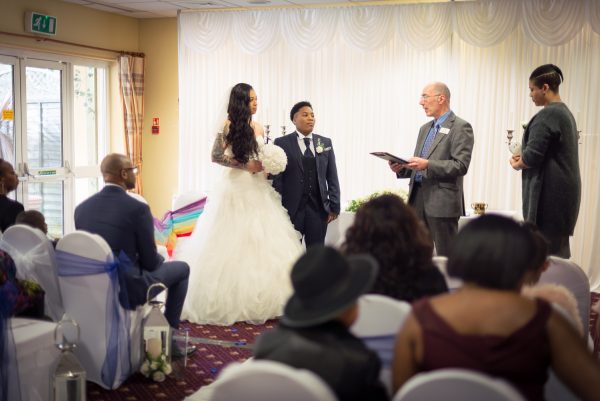
by Michael | Aug 2, 2018 | Blog
With same-sex weddings legal in England & Wales for some time now, they are becoming increasingly popular. But not with everybody. Indeed, same-sex ceremonies is an area which may provoke major opposition from the family. Let’s therefore take a serious look at this issue.
The guest list
All weddings face the inevitable question: whom do you invite? Selecting your guests is a tough one to answer at the best of times. You will probably start with close family and friends, but what if your closest relatives oppose your union?
Rejecting the rejectors
If it looks like relatives will boycott your ceremony, do you go with the flow and simply not invite them? Isn’t it better all round to opt for your friends and (supportive) relations? After all, you’re likely to be spending a huge amount of money on the reception. Why should you have to accommodate people who won’t accept what you’re doing and, at worst, might even turn out to be trouble-makers?
No one would blame you for thinking twice before inviting people openly hostile to your union. On the bright side, they might decline and at least you’ll have gained kudos by having extended the olive branch!
An unexpected “win”
Another advantage from inviting disapproving relatives is that they might, albeit grudgingly, attend and – who knows? – even enjoy a tasteful and personalised ceremony. Wouldn’t that be something if you were able to ‘convert’ them and retain – even develop – a warm relationship with them?!
For many of us, there is the bond of love that unites us with our families. We may not always like our relations, but to upset and potentially do without them for the rest of our lives is something we would do only when all else has failed. Giving them a chance to stay connected with you (even loosely) is surely worth the effort.
If the worst comes to the worst, at least you’ll know you tried. And you stand to gain such a lot, if you can bring those relatives together with you.
Come what may, your ceremony will be a commemoration of love, with promises for the future. It’s not the day to heal rifts, but it may be the pathway to do so, and that is something which should be embraced.
A few thoughts
Why should a gay wedding be drastically different to a traditional, heterosexual one? There’s no reason why women should not be in white, and carrying bouquets of lilies. Men can certainly be in suits. The wedding day is the most important day of their lives, and they are entitled to choose to mark it by looking their very best. The affair can be elegant and tasteful – and, in my view, should be.
Gay marriage is legal in most States of the US and is becoming commonplace in the UK too, so let’s become more comfortable with the concept.
In a ‘traditional’ gay wedding, there are some questions to consider: should there be “bridesmaids” – or even whatever the masculine equivalent is? Or a combination of them? And what about surnames? Should either of the pair change their name after marriage? If so, which one? Presumably, that will be down to choice.
There may be some decisions for the officiant: instead of “you may kiss the bride”, the easiest thing would simply be “you may kiss”.
Of course, at present, there’s not really much of a precedent for gay marriages, so the traditions are up for grabs. But do we need to invent any, actually?
To find a civil celebrant for your personalised wedding, look no further than https://vowsthatwow.co.uk/civil-weddings/
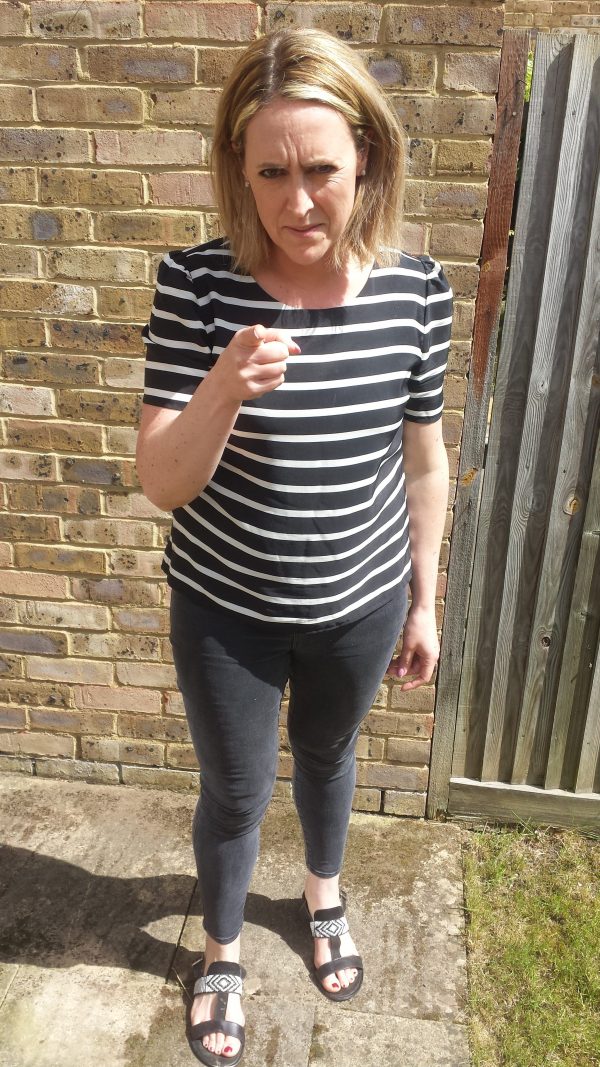
by Michael | May 11, 2018 | Blog
Sadly, couples are not always free to marry as they please. Very often they encounter opposition from their family. I know one mother who threatened to boycott the wedding (taking her whole family with her) because the couple had not opted for her chosen celebrant! It makes one wonder whose wedding it actually is.
The most common reason for opposing the wedding is disapproval of the new spouse. Perhaps he/she is not of the “correct” social class or colour. Maybe it’s a question of his/her sexuality. The truth may well be disguised, with a pretext such as “he/she isn’t worthy of you” or “they won’t be able to support you.”
The guest list
All weddings face the inevitable question: whom do you invite? It’s a tough one to answer at the best of times. You will probably start with close family and friends, but what if your closest relatives oppose your union?
Do you still include them?
Rejecting the rejectors
Do you decide to leave them out and just opt for your friends and (supportive) relations? After all, do you want negative people at your big day? They might bring the mood down – and, at worst, cause trouble.
Certainly, you’ll think twice before inviting people openly hostile to your union. On the bright side, they might decline and at least you’ll have gained kudos by having extended the olive branch!
Another olive branch
Another benefit that could accrue from inviting disapproving relatives is that they might, despite their own prejudices, attend and actually enjoy your tasteful and personalised ceremony. Wouldn’t that be something if you were able to ‘convert’ them and retain – even develop – a relationship with them?!
For many of us, there is the bond of love that unites us with our families. We may not always like our relations, but to upset and potentially do without them for the rest of our lives is not always desirable. Giving them a chance to stay connected with you (even loosely) is worth the effort.
If the worst comes to the worst, at least you’ll know you tried. And if it brings you together, couldn’t that be precious?
Come what may, your wedding will be a commemoration of love, with promises for the future. It’s not the day to heal rifts, but it may be the pathway to do so, and that is something which should be embraced.
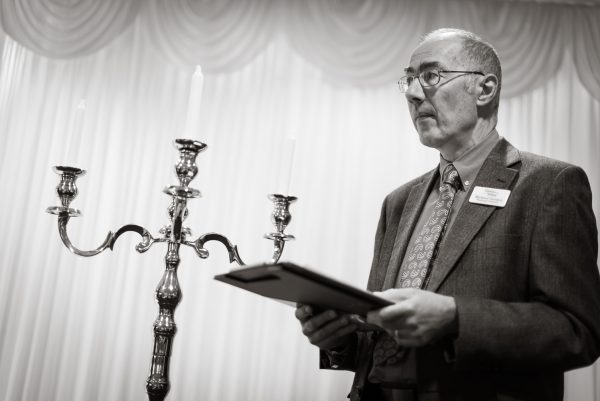
by Michael | Jun 13, 2017 | Blog
“I don’t mean to be rude, but do we actually need civil ceremonies?” The question emerged over networking when a lady I had just met found out what I did for a job.
No offence was intended, or taken. And, to some extent, she had a point.
A religious society
After all, over 50% of the UK population consider themselves Christian (according to recent research). So why would they need civil ceremonies at all? A little over 25% professed no religion. So they’ve got the option of a secular ceremony at the register office. OK, that leaves some people out, but it does cover most people.
But hold on a moment!
Religious objections
Not everyone who claims to be “religious” wants a full, standard religious ceremony, do they?
And what do you do, if you do want a religious ceremony, but are marrying someone of a different faith? Church isn’t an option, if you are Catholic and divorced. What if your church won’t accept you because you’re gay? And what if a religious service doesn’t really rock your boat, but do want a blessing or a prayer (mainly to keep parents happy, say)?
The secular option
In all those cases, when the Church won’t provide what you want, you have to turn to the Register Office. There they will read out the standard, necessary words to make your marriage legal. But, unfortunately, the ceremony must be totally secular (and impersonal). It can be a bit of a conveyor-belt operation.
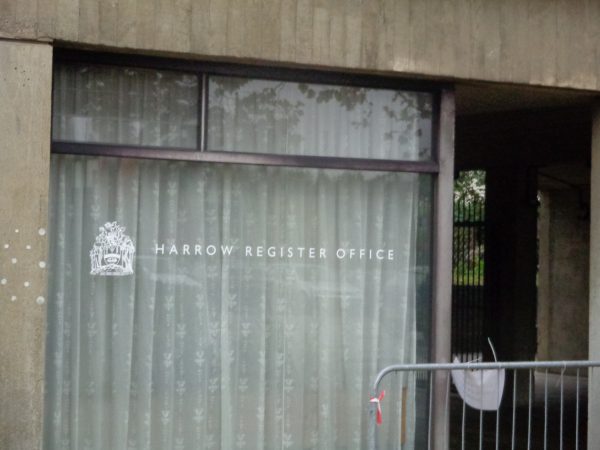
In surroundings that may not be much to write home about!
So, I hear you ask, is there another option?
A real choice
Indeed. As I explained to the lady, that is where a civil celebrant comes into his or her own.
The assets of a civil celebrant are that they build a ceremony from scratch. A good celebrant takes the time to work with the clients to offer ideas and also guidance about what is possible and might work. He will ask questions (and supply answers too), so that he can build up a full picture of what the couple wants. He will then write or compile a ceremony that reflects their personalities and beliefs, and is everything they want it to be.
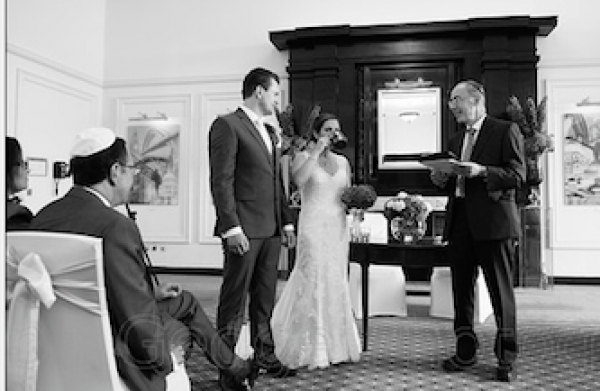
Photo courtesy of Philippa Gedge
Not only will the ceremony be personalised and unique but it will tick the other box: it can be as religious as the couple want it to be.
It should be pointed out that civil celebrants are not (yet) licensed to conduct legal marriages, so the registrar ceremony is still compulsory. However, once the legal formalities are over, you can enjoy a fabulous meaningful ceremony that will be memorable for all the right reasons!
I believe, after our conversation, that that lady understood my role a bit better – and didn’t regret her question too much!
Of course, if any reader wants to follow up with me, I’d be delighted to explain more. Please feel free!

by Michael | May 8, 2017 | Blog
Having recently conducted a wonderful same-sex wedding, I started doing a bit of mulling. Presumably, there are major differences between heterosexual and same-sex ceremonies?
Dress
In this particular case, as you can see, one spouse wore a white wedding dress; her partner wore a lounge suit and tie. Obviously, formality was what the pair wanted, and that fitted the bill.

So one tick on the list of similarities straight away.
Family
Probably not so simple. What if the family opposes your marriage? Especially if it’s same-sex.
There are plenty of examples, however, of obstacles being placed in the way of heterosexual couples, so this is a similarity, rather than a difference.
Incidentally, a possible solution to this problem is to use diplomacy. You may be able to encourage the parent (or whoever) to feel more positive by inviting them to participate in some way in the ceremony, for example, by doing a reading. Or you might assure them that you will (still) visit them as regularly as before at weekends/holidays etc.
Of course, you should get them to meet and get to know your partner, preferably informally. If the charm offensive doesn’t work, then think about asking your officiant to have a word.
If you want a religious (or part-religious) ceremony (or your parent does), then you can always use a civil celebrant like myself.
So not that different, whether the wedding is same-sex or heterosexual.
Suppliers
A few venues may have problems with gay ceremonies, but decreasingly so. In the same way, some suppliers may not want to work with a same-sex couple. You may recall that an intransigent anti-gay cake-maker in America was prominent in the news a year or two back. The fact that that was a big news item highlights the rarity of such an occurrence.
Problem areas
The only area that may cause a problem in a single-sex ceremony, as opposed to a heterosexual one, lies in vocabulary. Is the couple to be referred to at the end as “Mr and Mr Jones” or “Mrs and Mrs Smith”?
It’s possible that some of the readings will need a bit of rewording, but essentially the same-sex and heterosexual ceremony should turn out to be much the same.
The celebrant can always alternate the names, so it isn’t always the same person being addressed or referred to first.
As we have seen, the differences are actually not so great between heterosexual and same-sex ceremonies. I hope that will reassure you that absolutely nobody needs to be put off from arranging a same-sex ceremony!
Don’t forget that I can help out! Just send me an e-mail or give me a call.

by Michael | Oct 18, 2016 | Blog
Hurrah for the rise of mixed-faith ceremonies!
People are beginning to realise that weddings, naming ceremonies, and even funerals, do not have to be confined to either the full religious or the totally secular. There really is a middle ground.
More and more people are marrying outside the church (or synagogue, temple etc.). In 2011, 59.3% of the population considered themselves Christian, which leaves a lot of people who don’t. Moreover, 25.1% professed no religion at all.
Did you know…?
Interestingly, only 30% of weddings in 2015 were celebrated in a place of worship. Of the remaining 70% who opted for a civil ceremony, some chose the register office, but most preferred approved premises. The latter mostly meant hotels (42.8%) followed (11.6%) by corporate and event spaces.
So people are voting with their feet, as it were.
Why the rise of part-religious ceremonies?
Of course, a number of churches will not marry a couple if they don’t comply with certain conditions. A divorcee may not marry in a Catholic church. So the only way these people can have a religious (or part- religious) service is to use a civil celebrant.
The same applies for people who may prefer a secular service, but who want to respect the wishes of parents, say. They’d therefore like a few (possibly, minimal!) religious elements.
In a similar way, some couples will choose to include a religious element or two as a gesture to guests who are religiously active.
More commonly, however, people of mixed faith may want to embrace and celebrate both their religions and cultures. A civil ceremony will allow just that.
Mixed-faith
I have been privileged to offer a number of couples the opportunity to pick the elements from two religions that they want to include and share. For example, we have had the bride circle the groom (multiple religions), the groom has stamped on a glass (Jewish) and both have “jumped the broom” or undergone handfasting ceremonies (pagan), and we have drunk from the Loving Cup (a variation of a Christian ritual).
So there are a goodly number of reasons why the trend for civil weddings (and celebrations) is rising.
To find out how I, as a civil celebrant, can help you, please get in touch with me for a non-obligation chat. I look forward to hearing from you.
Featured image courtesy of Philippa Gedge photography.





